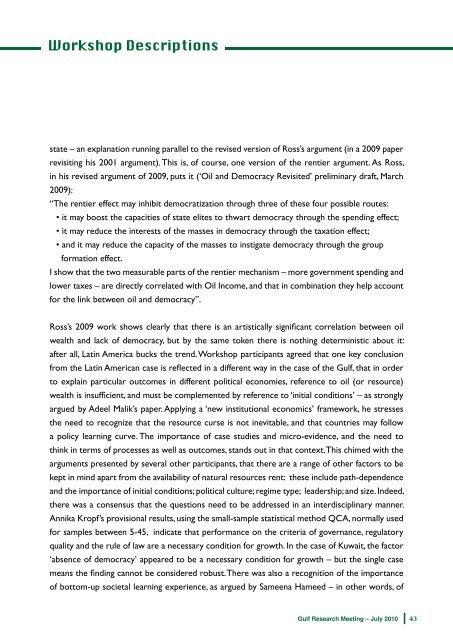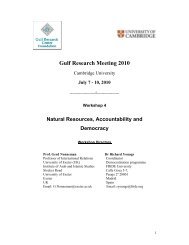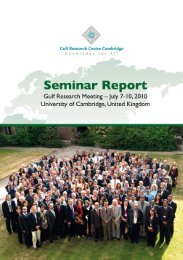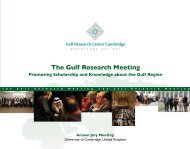GRM 2010 Report - Centre of Islamic Studies - University of ...
GRM 2010 Report - Centre of Islamic Studies - University of ...
GRM 2010 Report - Centre of Islamic Studies - University of ...
You also want an ePaper? Increase the reach of your titles
YUMPU automatically turns print PDFs into web optimized ePapers that Google loves.
state – an explanation running parallel to the revised version <strong>of</strong> Ross’s argument (in a 2009 paper<br />
revisiting his 2001 argument). This is, <strong>of</strong> course, one version <strong>of</strong> the rentier argument. As Ross,<br />
in his revised argument <strong>of</strong> 2009, puts it (‘Oil and Democracy Revisited’ preliminary draft, March<br />
2009):<br />
“The rentier effect may inhibit democratization through three <strong>of</strong> these four possible routes:<br />
• it may boost the capacities <strong>of</strong> state elites to thwart democracy through the spending effect;<br />
• it may reduce the interests <strong>of</strong> the masses in democracy through the taxation effect;<br />
• and it may reduce the capacity <strong>of</strong> the masses to instigate democracy through the group<br />
formation effect.<br />
I show that the two measurable parts <strong>of</strong> the rentier mechanism – more government spending and<br />
lower taxes – are directly correlated with Oil Income, and that in combination they help account<br />
for the link between oil and democracy”.<br />
Ross’s 2009 work shows clearly that there is an artistically significant correlation between oil<br />
wealth and lack <strong>of</strong> democracy, but by the same token there is nothing deterministic about it:<br />
after all, Latin America bucks the trend. Workshop participants agreed that one key conclusion<br />
from the Latin American case is reflected in a different way in the case <strong>of</strong> the Gulf, that in order<br />
to explain particular outcomes in different political economies, reference to oil (or resource)<br />
wealth is insufficient, and must be complemented by reference to ‘initial conditions’ – as strongly<br />
argued by Adeel Malik’s paper. Applying a ‘new institutional economics’ framework, he stresses<br />
the need to recognize that the resource curse is not inevitable, and that countries may follow<br />
a policy learning curve. The importance <strong>of</strong> case studies and micro-evidence, and the need to<br />
think in terms <strong>of</strong> processes as well as outcomes, stands out in that context. This chimed with the<br />
arguments presented by several other participants, that there are a range <strong>of</strong> other factors to be<br />
kept in mind apart from the availability <strong>of</strong> natural resources rent: these include path-dependence<br />
and the importance <strong>of</strong> initial conditions; political culture; regime type; leadership; and size. Indeed,<br />
there was a consensus that the questions need to be addressed in an interdisciplinary manner.<br />
Annika Kropf’s provisional results, using the small-sample statistical method QCA, normally used<br />
for samples between 5-45, indicate that performance on the criteria <strong>of</strong> governance, regulatory<br />
quality and the rule <strong>of</strong> law are a necessary condition for growth. In the case <strong>of</strong> Kuwait, the factor<br />
‘absence <strong>of</strong> democracy’ appeared to be a necessary condition for growth – but the single case<br />
means the finding cannot be considered robust. There was also a recognition <strong>of</strong> the importance<br />
<strong>of</strong> bottom-up societal learning experience, as argued by Sameena Hameed – in other words, <strong>of</strong><br />
Gulf Research Meeting – July <strong>2010</strong> 43





